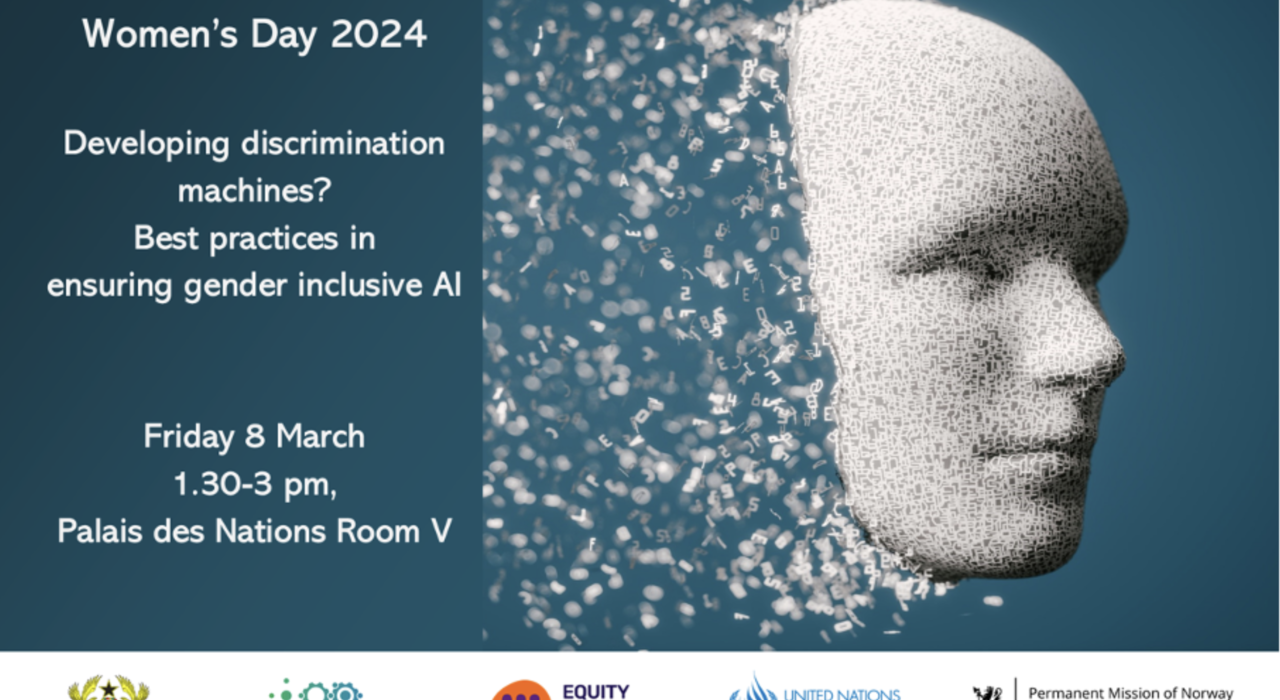Developing discrimination machines? Best practices in ensuring gender inclusive AI
PERMANENT MISSION OF NORWAY TO THE UNITED NATIONS AND OTHER INTERNATIONAL ORGANISATIONS IN GENEVA.
On International Women’s Day, Ghana and Norway as co-champions of the UNFPA Equity 2030 Alliance, together with UN Agencies and Women at the Table are organising a panel discussion to explore challenges and best practice in developing gender inclusive approaches to artificial intelligence.
Location: Palais des Nations Room V
Register here
AI has the potential to be enormously beneficial. As the High Commissioner for Human Rights has said, AI could improve strategic foresight and forecasting, democratize access to knowledge, turbocharge scientific progress, and increase capacity for processing vast amounts of information.
But what are the canaries in this gold mine? The robustness of the new systems that we develop will depend on making sure we do not recreate old stereotypes in order to ensure that risks do not outweigh benefits.
Leading up to Summit of the Future: Multilateral Solutions for a Better Tomorrow, UN Women recently published a study on placing gender at the heart of Global Digital Compact, a once in a generation opportunity to establish a framework for digital cooperation. Other actors have developed or are in the process of publishing documents to help guide the way forward within their respective sectors or organisations.
Purpose
This event will gather representatives across health, humanitarian, human rights and labour sectors and look at measures that have been taken – or need to be taken – to ensure gender inclusive approaches to AI.
Speakers
- Welcome by Amb. Tormod C. Endresen, PR of Norway
- Introduction by moderator Caitlin Kraft Buchman, Co-Founder and Leader of Women at the Table and A+ Alliance
- Setting the scene by Helène Molinier, UN Women Senior Adviser on Digital Gender Equality Cooperation (Conclusions from CSW 2023, the road towards Global Digital Compact and Summit for the Future)
- A practitioner’s perspective by Ishita Barua, Co-founder and Chief Medical Officer, Livv Health
Updates from key actors:
- Labour: AI and the future of work by Mia Seppo, ILO Assistant Director-General of for the Jobs and Social Protection Cluster
- Human rights: Grounding artificial intelligence in human rights by Scott Campbell, OHCHR Senior Human Rights Officer, Technology and Human Rights Project lead
- Humanitarian: Using AI to support the delivery of protection mandates by Hovig Etyemezian, UNHCR Head of Innovation Service and Rebecca Moreno Jimenez, Data Innovation Programme Lead
- Health: Regulation of AI for health by Steve MacFeely, WHO Director of Data and Analytics
- Q&A and statements from the floor
- Closing remarks by Amb. Emmanuel Kwame Asiedu Antwi, PR of Ghana

